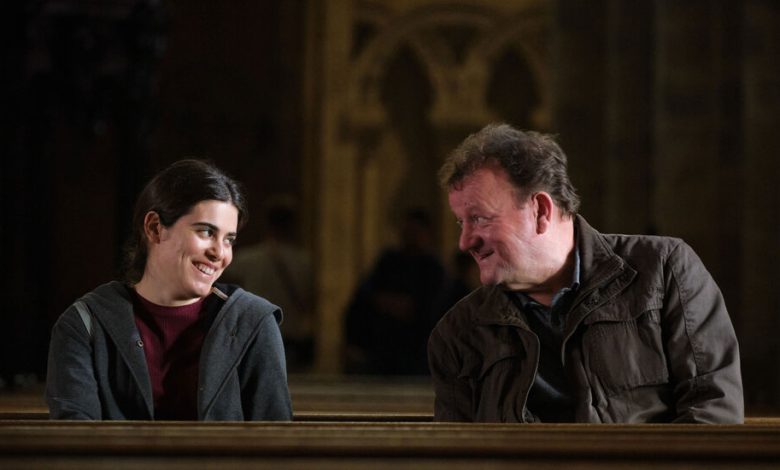‘The Old Oak’ Review: The Audacity of Hope

“The Old Oak” is named for the pub where much of its action happens — an old drinking hole in a village outside of Durham, England, that’s seen better days. Its back room, once a gathering place for the miners and their families who populated the town a generation ago, has been locked up for many years, fallen to disuse. Its walls are still hung with photographs of those miners taken during the lengthy strike of 1984-1985, a labor effort that ended without the resolution the miners sought and with weakened trade unions. But during the action, the village marched in solidarity — at least for a while — and came together to share meals in that back room, to support one another, a point of pride for the men who were children back then.
When the movie begins, it is 2016, the year of the Brexit vote. It’s hard to imagine that kind of unity happening any more. The village has slowly emptied out, closing down places like the church hall, which had been a gathering spot. The village’s real estate is being bought up at auction by entities abroad, driving down the value of houses owned by locals, leaving them with nothing to live on in old age. Jobs are scarce. Money is tight. Children barely have enough to eat. And so in the Old Oak, a handful of regulars sit around, bitterly decrying the state of things.
They have lately found a target for their rage: a few families of Syrian refugees who have been settled in the village, helped along by a local charity worker named Laura (Claire Rodgerson) and Tommy Joe Ballantyne (Dave Turner), who goes by TJ and owns the Old Oak. He’s the one who has to listen to the regulars gripe and spew racist epithets about the refugees, always clarifying that they’re “not racist.” He says nothing. He doesn’t think he can. He needs their business to scrape by. He knows their private lives are no picnic either. And if the pub isn’t there, they’ll just go home and wind one another up on the internet anyhow.
But TJ is lonely, and cares about the newcomers, though he’s afraid at first to become too involved with their lives. He strikes up an unlikely friendship with Yara (Ebla Mari), a young Syrian woman who speaks English, having learned after two years of volunteering with nurses while living in the refugee camps. Yara has arrived in town with her mother and several younger siblings. They don’t know where their father is because he was taken from them by the Bashar al-Assad regime. Her life has been worse, by any measure, than those of the men in the pub — but it feels almost obscene to make the comparison.
You’d know “The Old Oak” was directed by Ken Loach (from a screenplay by his long-running collaborator Paul Laverty) even if his name wasn’t in the credits. His late work is unmistakable, driven by fierce moral clarity and outrage on behalf of the people whom capitalism and Britain’s government, supposedly constructed for citizens’ benefit, have left behind. His previous film “Sorry We Missed You,” for instance, is a blindly infuriated (and infuriating) film about a father who takes a job as a delivery driver to make ends meet, only to discover that everything about this job is designed to prosper the owner but ruin his life and his family.